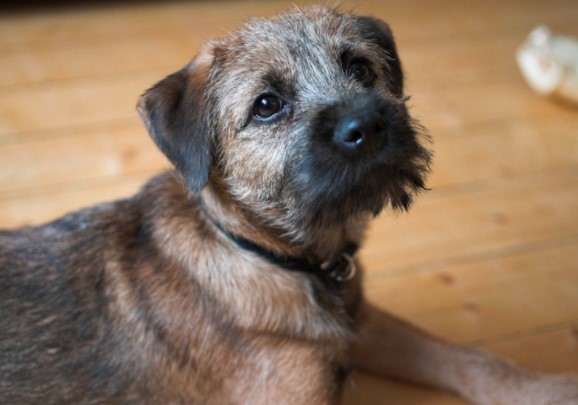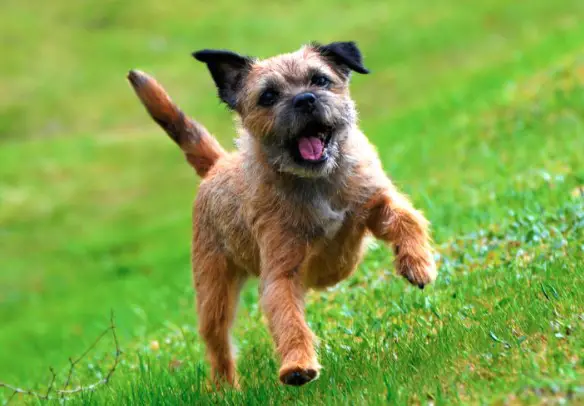Border Terrier is a small dog originally from Great Britain. She loves to show her hunting disposition, but at the same time, she is very cheerful and active. Such a baby will be a great pet for anyone, regardless of age.
Character
All owners are sure of one thing – the nature of the Border Terriers is soft and flexible. The dog is friendly, always ready to frolic and play with the owner. This baby is attached to his master for life. There are cases when a terrier died during a long separation.
Attention and communication with people are a must for the Border Terrier. They need active games on a daily basis and, if possible, meetings with other dogs of different breeds. This will make your dog’s life truly happy.
Borders distinguished themselves with a good, stable psyche, courage, and endurance unimaginable for dogs of this size. The dog will be friendly with a new person, but he will still sniff him without losing his vigilance.
Although the terrier did not stand out in size, he is always ready to protect his family – and especially the owner. Even on a larger dog, he attacks completely fearlessly.
Despite such bravery, in the home circle, the terrier is absolutely calm and affectionate. He will happily lie down next to you while you watch TV, and play ball or go for a walk. The dog loves all family members, but it has much higher feelings for its owner.
If it’s raining outside – this is not a reason not to go for a walk! This is the motto of the Border Terrier. Its dense, coarse coat with a thick undercoat prevents raindrops from reaching delicate skin. So you have to walk every day, regardless of the weather. And such an active and cheerful dog needs 2 to 4 hours of being outdoors every day.
Do not deny yourself and your pet the desire to play something in the nearest park. Take a ball or frisbee from home and give your dog a good stretch without a leash.
Border Terriers are often found in nursing homes. They perfectly know how to brighten up elderly people, and they are also used as four-legged doctors. This is especially popular in Europe.
Education and training
Border Terriers are incredibly smart and intelligent animals. Their training will not take the owner almost any work. There are a few things that are important to teach your puppy at a young age.
Train your dog to walk in noisy places. Terriers get along well even in not the largest apartments. They will have walks in busy and sometimes very noisy places.
As soon as your puppy is comfortable with his own backyard, start slowly taking him out to more noisy areas: walk along highways or in parks where there are many people. Don’t scold your puppy if he barks or runs away from a doorbell or noisy TV, but don’t comfort him either. The dog will take this as a reward and will only grow bigger. Try not to pay attention, and next time sit down to watch TV with him.
If this practice is not carried out in childhood, the dog will grow up timid and fearful. It will be difficult to cope with the education and training of a border terrier at a more mature age.
Well, the training process itself can be carried out both independently and with the help of professionals. Do not forget that if the owner trains his dog himself, their bond becomes even stronger, as does mutual understanding. No coaching session can replace the time you could spend together.
Do not scold the terrier if he does not immediately execute some commands. This will make the dog insecure and dislike training. Do not forget that regardless of her success, the main animal is to be useful to the owner. The dog himself understands that he made a mistake, there is no need to tell him about it again.
Try to diversify your activities, make them more interesting. For example, instead of throwing a stick on a well-mowed lawn, throw it into the bushes, let the dog enjoy the search.
Care and maintenance
Border Terriers, due to their compact size, get along well even in small apartments. However, in a country house, they feel good. Due to its energy, the dog needs regular walks, active games, and physical activity.
Until the puppy is 7 months old, he cannot control his bladder. At this age, you can teach him to walk in the tray. After every meal or sleep, have your baby sit down in the toilet to get him done. Be sure to praise him for such a feat. You can take a dog outside for only 6 months.
The bed should be in a quiet, moderately lit place. You shouldn’t put your dog’s mattress in the darkest corner, but bright light will make sleeping uncomfortable. A corner in the hallway or in the bedroom is perfect. The main thing is that there are no drafts or any heating devices in the place where the dog sleeps in order to avoid colds and overheating, respectively.
You need to comb the dog several times with a special brush. Although the Border Terrier does not shed much, if you do not remove the dead hairs, they will spread throughout the house.
It is enough to bathe your dog once a month with regular dog shampoo. Avoid taking long baths – just pouring water on your pet from the shower. Avoid getting water in your ears. After each walk, wash your dog’s paws or wipe them with a damp cloth.
Even if you keep your dog in a private house with its own yard, it needs regular walks. On average, the walk should last 45-70 minutes and be done at least 3 times a day. Relaxed walking will not work, the border terrier needs an asset. Take your dog where there are no people and you can release it from the leash. Play with her, give her plenty of running time.
Remember to check your dog’s eyes and ears daily for dirt. Do this after every walk or hunt. Dogs love to run through bushes and tall grass, where they can pick up ticks or other animals. The eyes are cleaned as needed with cotton pads dipped in warm boiled or chamomile broth, and a cotton swab is perfect for the ears.
You need to brush your dog’s teeth 3-4 times a week using a special brush and toothpaste, and also give the dog cartilage as a preventive measure. It is enough to cut the nails once a month.
Reception appropriate care and maintenance of the Border Terrier will live with you 13-15, and perhaps a little more.
Pros
- the dog is very active;
- loyal and friendly;
- developed intelligence;
- does not conflict with other dogs;
- small size;
- ideal pet for families with children from 7 years old;
- can take part in hunting small animals.
Cons
- cannot stand loneliness;
- needs constant physical activity;
- the tendency to allergies and obesity;
- does not tolerate rodents;
- joint weakness can become a serious condition with age.

